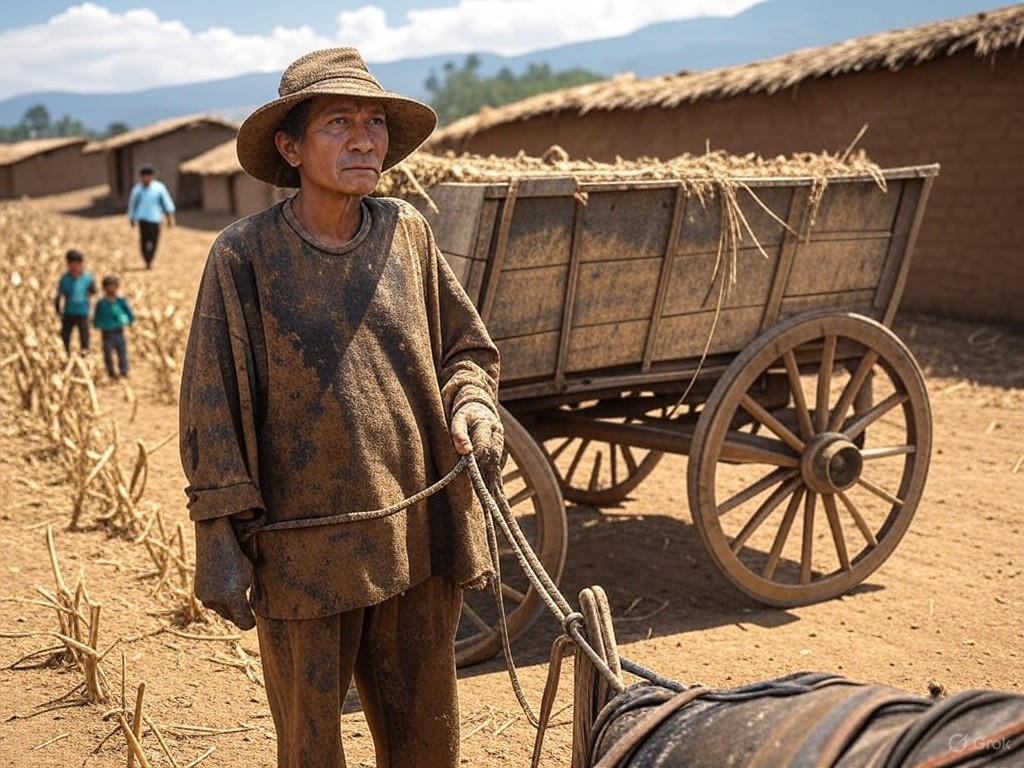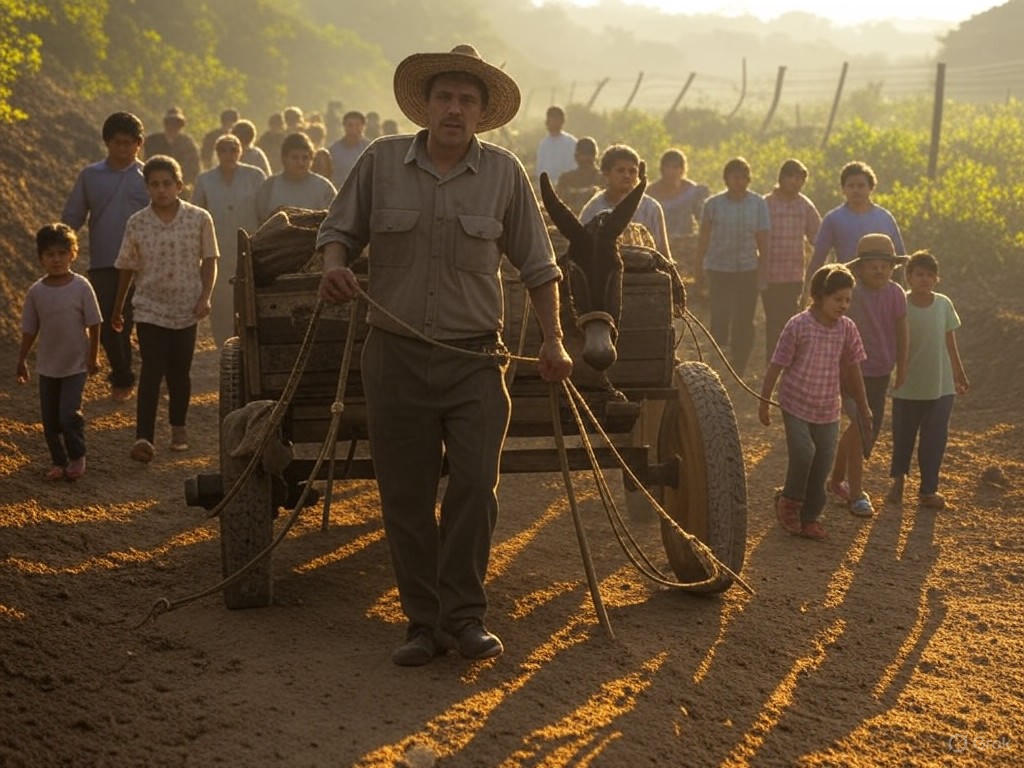Global Migration Crisis: Central America’s Exodus
As I sit here with my pipe and a cup of coffee, reminiscing like an old riverboat captain on the Mississippi, I can't help but think of the great human currents that shape our world. Picture, if you will, a sturdy farmer from the highlands of Guatemala, his calloused hands gripping the reins of a mule-drawn cart, eyes fixed on a horizon that promises more than the barren fields he's leaving behind. That's the story of Central American migration—a tale of hardship, hope, and the unyielding human spirit. Yet, as Silas Twaine, I must steer this narrative toward a sensible course, one that honors tradition, embraces free-market principles, and calls for limited government involvement to address the mounting pressures at our borders. Today, we examine the migration crisis in Central America, its deep-rooted drivers, and the global responses that could either stem the tide or let it overwhelm us.
This humanitarian crisis, driven by economic woes and instability, has seen millions flee their homes in search of stability. From Honduras to El Salvador, the flow of people across borders underscores a fundamental truth: when economies falter and governments overreach, folks seek opportunity elsewhere. But let's not romanticize the journey; it's a perilous one, fraught with dangers that test the very fabric of human endurance. As we delve deeper, we'll analyze the root causes, present evidence from reliable sources, and conclude with a balanced call for action that prioritizes self-reliance and prudent policy over expansive intervention.
The Drivers of the Exodus: Economic Struggles and Governance Failures
At the heart of Central American migration lies a perfect storm of economic stagnation and social unrest. For decades, countries like Honduras, Guatemala, and El Salvador have grappled with poverty rates exceeding 50% in some regions, where subsistence farming yields little more than a daily struggle.  "A bustling market in rural Guatemala, where vendors hawk meager goods, illustrating the economic despair that propels many toward migration."
"A bustling market in rural Guatemala, where vendors hawk meager goods, illustrating the economic despair that propels many toward migration."
From a center-right lens, the blame often falls on misguided policies that stifle free enterprise. Excessive government regulations and corruption have choked off investment, leaving markets stagnant and innovation stifled. Take, for instance, the impact of protectionist trade barriers that keep local farmers from competing globally. Instead of fostering self-reliance through open markets, bloated bureaucracies siphon resources into inefficient programs, perpetuating dependency. Geopolitics plays a role here too; neighboring influences, from Venezuelan-style socialism to the meddling of external powers, exacerbate instability. As The Wall Street Journal reports, much of the migration surge stems from "economic policies that prioritize state control over individual initiative, leading to chronic underemployment and despair."
Violence from gangs and cartels adds another layer, turning once-peaceful communities into no-go zones. In El Salvador, for example, gang-related homicides have driven families to seek refuge northward, not out of whim but necessity. Yet, it's not just lawlessness; it's the failure of governments to enforce order without overstepping into citizens' lives. A limited government approach—focusing on targeted law enforcement and community-based initiatives—could empower local leaders to reclaim their streets, rather than relying on foreign aid that often comes with strings attached.
Evidence and Analysis: The Humanitarian Crisis at Our Borders
The evidence paints a stark picture of a region in flux, with migration numbers soaring in recent years. According to the United Nations, over 800,000 migrants from Central America attempted to reach the United States in 2022 alone, a figure that strains border resources and highlights the geopolitical ripple effects across the Americas.  "A line of Central American families waiting at a remote border checkpoint, capturing the human face of the migration crisis and the pressures on international boundaries."
"A line of Central American families waiting at a remote border checkpoint, capturing the human face of the migration crisis and the pressures on international boundaries."
This influx isn't merely a humanitarian crisis; it's a test of borders as guardians of sovereignty and tradition. From a free-market perspective, the solution lies not in erecting walls or opening floodgates, but in bolstering economic ties that create jobs at home. For instance, trade agreements like the United States-Mexico-Canada Agreement (USMCA) have shown promise in stimulating growth, yet their potential in Central America remains untapped due to local resistance to deregulation. A Brookings Institution analysis notes that "investments in private-sector development, such as agribusiness and technology hubs, could reduce migration by 20-30% through job creation, far more effectively than aid-dependent programs."
Consider the case of Honduras, where foreign direct investment has lagged behind due to bureaucratic hurdles. If governments streamlined regulations and encouraged entrepreneurship, we might see a revival akin to the post-war economic booms in Asia, where free markets lifted millions without massive welfare states. Yet, global responses have often favored short-term fixes, like international aid packages that treat symptoms rather than causes. The Heritage Foundation's geopolitical overview warns that "without emphasizing fiscal responsibility and market reforms, such efforts risk creating a cycle of dependency that undermines traditional values of self-sufficiency."
Balanced analysis requires acknowledging the human element: these are not invaders but families seeking the American Dream, much like my own ancestors who crossed oceans for opportunity. However, unchecked migration pressures borders, straining public services and challenging the rule of law—pillars of traditional society. A center-right approach advocates for streamlined legal immigration processes that reward merit and skills, ensuring that borders remain secure while welcoming those who contribute to our shared prosperity.
A Path Forward: Limited Government and Free-Market Solutions
In concluding this tale of migration, we return to the farmer from Guatemala, his story a microcosm of a larger narrative. The global response must pivot toward sustainable solutions that uphold traditional values like personal responsibility and community resilience. Instead of expansive government programs that breed inefficiency, let's champion free-market initiatives: incentivize private investment in Central America's agriculture and tech sectors, forge bilateral trade deals that open doors without overwhelming borders, and support local governance that enforces laws fairly and firmly.
Folks, as I lay down my pen, remember that the tides of migration need not capsize our ship. With prudent policies, limited government, and a nod to free markets, we can chart a course that honors both compassion and common sense. After all, in the words of an old storyteller, the best adventures are those where everyone finds their rightful place.

